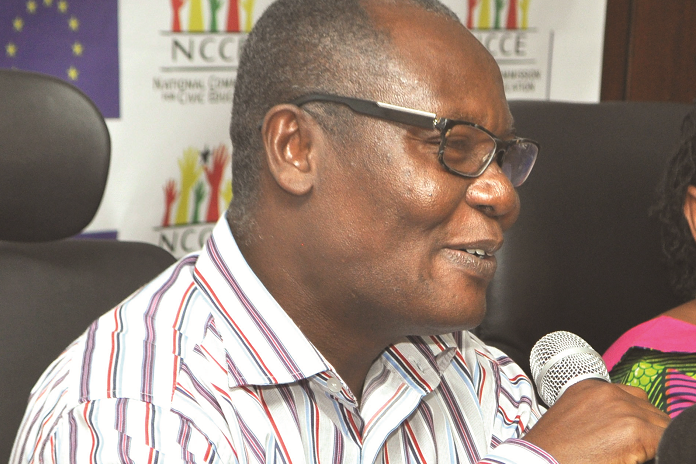
NCCE urges parties to educate supporters on spoilt ballots
The chairman of the National Commission for Civic Education (NCCE), Mr Samuel Akuamoah, has urged political parties to begin the process of educating their supporters on how to vote accurately to prevent the spoilage of ballots.
He said since they constituted a chunk of the votes cast, it would be beneficial for political parties to use their giant platforms to help reduce the high number of spoilt ballots recorded during elections.
“Over the years, the nation has been saddled with this canker of spoilt ballots and efforts to nip it in the bud has been difficult. We need a long-term strategy to address it,” Mr Akuamoah told the Daily Graphic.
Background
Although Ghana’s democracy is growing by the day, the menace of spoilt ballots is still an issue we have to grapple with. The country has witnessed high numbers of rejected ballots in all the six major elections that have been held since 1992.
Indeed, according to EC records, the number of rejected ballots recorded in the first round of the 2008 presidential race was unprecedentedly higher than ever, both in terms of percentages and in figures.
As many as 205,438 ballots, which constituted 2.4 per cent of 8,671,272 total votes cast, were rejected in the 2008 elections.
Many people have said jokingly that the “Rejected Ballot Party” placed third in the 2008 presidential race and that if rejected ballots were a political party, they could boast a steady increase in popularity ahead of the smaller parties.
In the 2012 general election, the number of rejected ballots stood at 251,720 (2.3 per cent). Although the number of rejected ballots as a percentage of the total votes cast reduced by 0.13 per cent from the 2008 rate of 2.4 per cent to 2.3 per cent in 2012, the 2012 rate was still higher than the 2004 rate of 2.2 per cent. Again, the number of rejected ballots in 2012 was higher than the total votes of the other presidential candidates, excluding those of the NDC and the NPP.
Undoubtedly, the issue of spoilt or rejected ballots has become one of the key things that undermine the will of the electorate and ultimately affects the country’s electoral processes.
In the first election in 1992, rejected ballots accounted for 3.6 per cent of the valid votes cast. This, however, reduced to 1.53 per cent in 1996. In the first round of the 2000 general election, it accounted for 1.8 per cent of the valid votes but reduced to 1.58 per cent during the presidential run-off. In 2004, it started soaring and constituted 2.2 per cent of the votes cast while in 2008 it went up further.
With those figures in mind, Mr Akuamoah said although the NCCE was doing its best to address the problem, the factors that caused spoilt ballots were beyond the scope of the commission and it would only take collaborative efforts to deal with the problem.
Drink-voting factor
In Mr Akuamoah’s view, drink-voting has been identified as one of the crucial factors responsible for the staggering figures of rejected ballots.
“In Ghana, a lot of people consume alcohol on election day before going to cast their votes. Most of them end up spoiling the ballots because they are drunk and therefore cannot clearly see the faces of the candidates,” he said.
Since there is no law in the country that forbids people who are drunk from voting, Mr Akuamoah said it was difficult for the NCCE or the Electoral Commission (EC) to address the problem.
Mr Akuamoah added that as part of measures to address the problem, the NCCE had developed a programme, dubbed: “Own your Life,” to educate Ghanaians on the need to stay away from alcohol on voting day.
Apart from that, Mr Akuamoah said, the commission was also engaged in other civic education activities in all the communities to educate the people on the right way to vote.
Mr Akuamoah also appealed to owners of bars not to open for businesses on the election day, adding that “once people realise that all the bars have been closed, they will have no option but to vote with their ‘clear’ eyes”.
